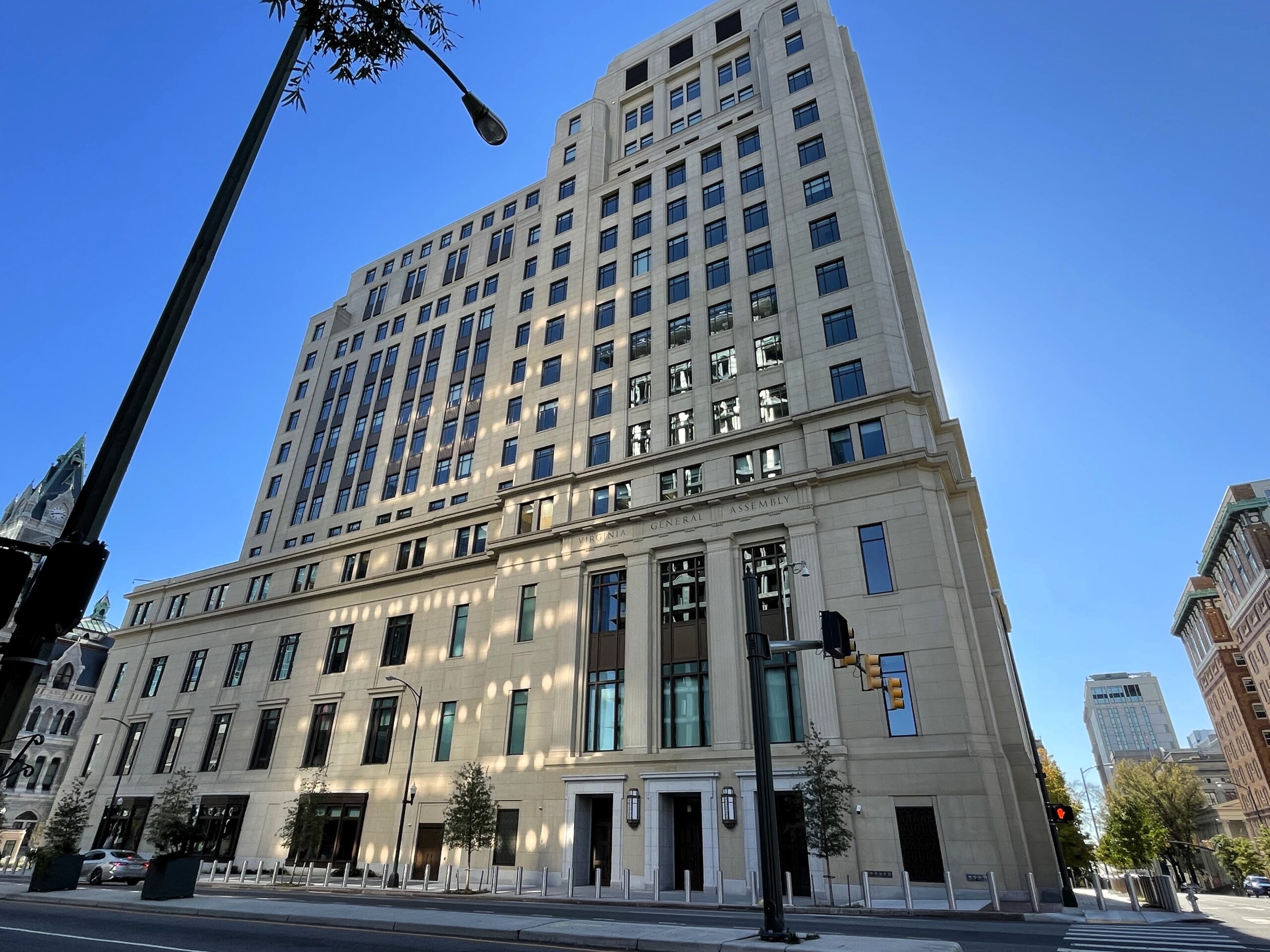Proposed changes to state law to address city tax collection issues like the ones that have been plaguing Richmond restaurant owners received a mixed reaction from Virginia legislators Tuesday.
Two-thirds of the Senate Finance and Appropriations Committee balked at Senate Bill 294, an amended version of which would allow Richmond and other cities to apply meals tax payments to the tax returns they accompany, rather than to delinquent accounts first as existing law requires.
The bill also would allow city finance directors to waive penalties and interest if it’s determined to be in the locality’s best interest. In Richmond, the accumulation of such fees without notice to the taxpayer has resulted in multiple restaurants receiving tax bills for tens or even hundreds of thousands of dollars owed.
But senators on the committee questioned whether other cities would have to change their tax collection practices for an issue that apparently has only been a problem in Richmond.
Sen. Creigh Deeds (D-Charlottesville), who led the vote against the bill, called it “a hammer aimed at one locality when we ought to be legislating statewide.”
“I think we were all embarrassed by what we read about the City of Richmond, and I don’t want to make any excuses for the city, but localities have the ability to fix this problem,” Deeds said. “This is going to affect one type of government, and I just don’t think it’s good policy.”
Sen. Bill DeSteph (R-Virginia Beach), the bill’s chief patron, described the bill as discretionary and optional to cities that wanted to apply it. He maintained that it had been drafted in consultation with the state treasurer’s office, the Virginia Municipal League and the Virginia Association of Counties.
“This is voluntary, so they can administer it if they want,” DeSteph said. “They don’t have to do it this way, but it allows them to do it this way if they’d like to.”
DeSteph was responding to Sen. Adam Ebbin (D-Alexandria), who took a similar stance to Deeds and others in the hearing.
“This impacts other cities besides Richmond differently than the rest of the commonwealth,” Ebbin said, adding the bill would create “a small administrative burden for cities like Lynchburg and Alexandria that utilize a director of finance.”
Deeds motioned for the bill to be passed by indefinitely, meaning the bill could be taken up by the committee later in the session but would die if it doesn’t. The motion passed 10-5.
Later in the day, a House version of the bill – H.B. 1483, patroned by Del. Delores McQuinn (D-Charles City) – was advanced by the House Finance Subcommittee, which voted unanimously to report it to the full committee.
A related bill – H.B. 1535 – likewise advanced to the full committee, which is scheduled to meet today (Wednesday). That bill, patroned by Del. Michael Jones (D-Richmond), would allow discretion on the application of a seller’s commission for businesses that collect meals taxes.
The commission allows businesses to keep a percentage of the meals taxes they collect to cover credit card processing fees used in collecting that tax, but only if their accounts are in “good standing” with the city. Richmond officials have said the requirement has contributed to the high delinquent tax bills seen among restaurateurs in the city.
The bills are aimed at putting a stop to what restaurant owners say has been a problem in Richmond for years: their monthly meals tax payments being applied to unknown late fees and interest charges that snowballed over time without notice from the city. City officials have maintained they are only complying with existing state law that requires that tax payments be applied to the oldest liability first.
The bills are supported by the Virginia Restaurant Association, which held a press conference last week demanding that Richmond pay back the penalties and interest to affected restaurants. The Richmond-based group was represented at Tuesday’s meetings in the General Assembly Building.
The seller’s commission bill, which the City of Richmond requested, is one of several steps the city is taking to address the issue. It’s also proposing changes to Richmond’s tax policy to address, among other things, interest and late-payment penalties applied on personal property taxes, which are currently assessed a 10 percent penalty with interest applied the first day a payment is delinquent.
The change, through an ordinance that’s set to be considered next Monday, would reduce the penalty to 2 percent for the first month and hold off interest until the following month.
Meanwhile, Brad Hemp, a former co-owner of Brenner Pass and Metzger Bar & Butchery who’s among those who have brought the issue to light, sent an email to Richmond City Council members Tuesday requesting a meals tax penalty amnesty, which he said would go further in addressing the issue than the ordinance.
“I applaud the proposed ordinance that will come up for a vote next week,” Hemp said, adding that its requirement that the city finance department assign meals tax payments as submitted “should prevent much of the problems of rolling penalties going forward.”
“However, the ordinance does not address the hundreds of restaurants saddled with millions of dollars in improper penalties,” Hemp said in proposing the amnesty, which he said could waive all penalties assessed for partial meals tax payments, contending that partial payments in most cases indicate that the rest was put toward delinquent balances without the taxpayer’s knowledge.
City Council is scheduled to consider the ordinance to authorize the changes at its Feb. 12 meeting.
Proposed changes to state law to address city tax collection issues like the ones that have been plaguing Richmond restaurant owners received a mixed reaction from Virginia legislators Tuesday.
Two-thirds of the Senate Finance and Appropriations Committee balked at Senate Bill 294, an amended version of which would allow Richmond and other cities to apply meals tax payments to the tax returns they accompany, rather than to delinquent accounts first as existing law requires.
The bill also would allow city finance directors to waive penalties and interest if it’s determined to be in the locality’s best interest. In Richmond, the accumulation of such fees without notice to the taxpayer has resulted in multiple restaurants receiving tax bills for tens or even hundreds of thousands of dollars owed.
But senators on the committee questioned whether other cities would have to change their tax collection practices for an issue that apparently has only been a problem in Richmond.
Sen. Creigh Deeds (D-Charlottesville), who led the vote against the bill, called it “a hammer aimed at one locality when we ought to be legislating statewide.”
“I think we were all embarrassed by what we read about the City of Richmond, and I don’t want to make any excuses for the city, but localities have the ability to fix this problem,” Deeds said. “This is going to affect one type of government, and I just don’t think it’s good policy.”
Sen. Bill DeSteph (R-Virginia Beach), the bill’s chief patron, described the bill as discretionary and optional to cities that wanted to apply it. He maintained that it had been drafted in consultation with the state treasurer’s office, the Virginia Municipal League and the Virginia Association of Counties.
“This is voluntary, so they can administer it if they want,” DeSteph said. “They don’t have to do it this way, but it allows them to do it this way if they’d like to.”
DeSteph was responding to Sen. Adam Ebbin (D-Alexandria), who took a similar stance to Deeds and others in the hearing.
“This impacts other cities besides Richmond differently than the rest of the commonwealth,” Ebbin said, adding the bill would create “a small administrative burden for cities like Lynchburg and Alexandria that utilize a director of finance.”
Deeds motioned for the bill to be passed by indefinitely, meaning the bill could be taken up by the committee later in the session but would die if it doesn’t. The motion passed 10-5.
Later in the day, a House version of the bill – H.B. 1483, patroned by Del. Delores McQuinn (D-Charles City) – was advanced by the House Finance Subcommittee, which voted unanimously to report it to the full committee.
A related bill – H.B. 1535 – likewise advanced to the full committee, which is scheduled to meet today (Wednesday). That bill, patroned by Del. Michael Jones (D-Richmond), would allow discretion on the application of a seller’s commission for businesses that collect meals taxes.
The commission allows businesses to keep a percentage of the meals taxes they collect to cover credit card processing fees used in collecting that tax, but only if their accounts are in “good standing” with the city. Richmond officials have said the requirement has contributed to the high delinquent tax bills seen among restaurateurs in the city.
The bills are aimed at putting a stop to what restaurant owners say has been a problem in Richmond for years: their monthly meals tax payments being applied to unknown late fees and interest charges that snowballed over time without notice from the city. City officials have maintained they are only complying with existing state law that requires that tax payments be applied to the oldest liability first.
The bills are supported by the Virginia Restaurant Association, which held a press conference last week demanding that Richmond pay back the penalties and interest to affected restaurants. The Richmond-based group was represented at Tuesday’s meetings in the General Assembly Building.
The seller’s commission bill, which the City of Richmond requested, is one of several steps the city is taking to address the issue. It’s also proposing changes to Richmond’s tax policy to address, among other things, interest and late-payment penalties applied on personal property taxes, which are currently assessed a 10 percent penalty with interest applied the first day a payment is delinquent.
The change, through an ordinance that’s set to be considered next Monday, would reduce the penalty to 2 percent for the first month and hold off interest until the following month.
Meanwhile, Brad Hemp, a former co-owner of Brenner Pass and Metzger Bar & Butchery who’s among those who have brought the issue to light, sent an email to Richmond City Council members Tuesday requesting a meals tax penalty amnesty, which he said would go further in addressing the issue than the ordinance.
“I applaud the proposed ordinance that will come up for a vote next week,” Hemp said, adding that its requirement that the city finance department assign meals tax payments as submitted “should prevent much of the problems of rolling penalties going forward.”
“However, the ordinance does not address the hundreds of restaurants saddled with millions of dollars in improper penalties,” Hemp said in proposing the amnesty, which he said could waive all penalties assessed for partial meals tax payments, contending that partial payments in most cases indicate that the rest was put toward delinquent balances without the taxpayer’s knowledge.
City Council is scheduled to consider the ordinance to authorize the changes at its Feb. 12 meeting.






This Meals Tax FIASCO is only the latest example of defective, incompetent management that has plagued the City for decades. When you look at these taxes, plus utility billing, building permits, neglected infrastructure, schools (both administration and infrastructure), and crime, and assess the total failure, the scope of incompetence is staggering. The City has not been well-run since the days of city manager-form of government. Robert Bobb was the last person in charge who didn’t have his head up his butt .Levar Stoney sure as heck can’t run this city. But he expects people to allow him to run the… Read more »
I have zero idea why Levar Stoney believes he would be a preferable candidate to Abigail Spanberger, who tossed her hat into the ring three weeks before he did. Anyone who has thrown money at his doomed campaign should have known better.
Levar has had his head inflated by Terry McAuliffe. It’s all about the self-delusional aura of political power, and Democratic PANDERING to win votes and stay in office. To be fair, Republicans also pander to segments of the population. They’re just not as experienced and adept as the Dems. Hope that answers your question.
If you donate to a campaign, and the campaign goes no place, doesn’t the politician get to just keep the money, or at any rate spend it on whatever he or she wants?
I’d heard that happened in VA.
So perhaps running for office just allows Stoney to collect on what he is owed?
What he is owed?? The only thing owed to Levar is a ride out of town on a one-way ticket.
Yes, Stoney owes a huge DEBT to the city — he wasn’t even from the city, and he represented himself as competent.
What he is owed by special interests
So let’s lay this out, Stoney and his band of casino pushers running the City say it’s not their problem, it’s the laws as they are written. And Senators are saying why change the laws for every other locality that can figure it out, when only the City has the issue with basic accounting. Like mentioned the other day by a commenter, why can’t the City simply hire an accounting firm to do what they can’t, and help them get their books in order? This isn’t a new problem. I got a penalty charge decades ago for a late payment… Read more »
Yes.
As far as outsourcing goes, how are they going to get their friends jobs they couldn’t get in the private sector if they reduce staff? Only well-run municipalities do things like that.
Richmond citizens get what they vote for. A mix of church leaders and activists instead of businesspeople and managers.
I still tend to believe the issue is not how payments are applied. It is that the billing is not transparent. In 2024 any business or resident should be able to login to a web portal and see their current tax owed, payment status and history. While the billing cycle could be monthly, quarterly, or annual that website should be updated daily to reflect payments received. The fact that the city instead cloaks all this in a black box of darkness is the root problem. If it was all transparent then any penalties and payments, etc would be visible. Then… Read more »
Stoney and that group down at city hall couldn’t balance a checkbook.Whats Terry McAuliffe doing these days?
Maybe we could get HIM to be mayor of Richmond — I don’t know about his accounting or his management skills (failed fake businessman as he was) but he IS adept at making bags of money magically appear. Even the convicted and jailed former mayor of Providence, RI Buddy Cianici was loved because even though they knew he was corrupt, he got jobs done and made the money appear. Plus, even though McAuliffe was allegedly the kind of con man that could be fooled by other con men (in his case as governor, these tended to be Chinese “business” interests,… Read more »
You’re right about Buddy. I was held prisoner in Westerly from 2000 – 2003, and saw Buddy on the local news just about every evening. Quite a character, but as you say – a master at getting things done. Probably the Italian blood in his veins. In spite of his zeal that eventually had him bustin’ rocks, he was a master at getting people to work together and accomplishing things, and sorely missed when he passed. Neither McAuliffe nor Stoney would be qualified to bring him Gatorade during time outs. But I wonder if he has a cousin who isn’t… Read more »
Italian is an interesting theory, but I have a perhaps more scientific one: He had a record, like some other Italian guys like Guilliani and Chris Christy, of coming up as a corruption FIGHTER, so he was not a mere fat idiotic beneficiary of corruption, he was a student and eventually a master of all of its angles. Corruption, and organized crime, works best when there are as many winners and as few losers as possible, and hopefully none of the losers lose so bad that they are really noticeable. Best not to make any unnecessary enemies and choose them… Read more »
BTW, the Prison population in RI has been increasing recently….